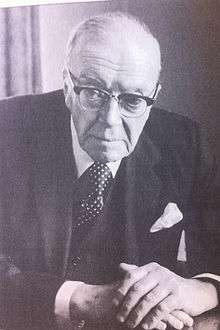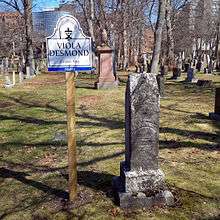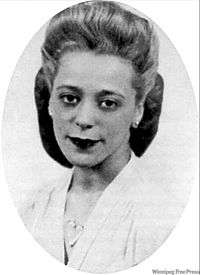Viola Desmond
| Viola Desmond | |
|---|---|
|
Viola Desmond | |
| Born |
Viola Irene Davis July 6, 1914 Halifax, Nova Scotia, Canada |
| Died |
February 7, 1965 (aged 50) New York, New York, U.S. |
| Nationality | Canada |
| Education | Bloomfield High School[1] |
| Occupation | Business owner and beautician |
| Spouse(s) | Jack Desmond |
Viola Irene Desmond (July 6, 1914 – February 7, 1965) was a Black Nova Scotian businesswoman who challenged racial segregation at a film theatre in New Glasgow, Nova Scotia in 1946. She refused to leave a whites-only area of the Roseland Theatre and was unjustly convicted of a minor tax violation used to enforce segregation. Desmond's case is one of the most publicized incidents of racial discrimination in Canadian history and helped start the modern civil rights movement in Canada. Desmond acted nine years before the famed incident by civil-rights activist Rosa Parks, with whom Desmond is often compared.[2] Desmond was granted a posthumous pardon, the first to be granted in Canada.[2][3] The government of Nova Scotia also apologized for convicting her for tax evasion and acknowledged she was rightfully resisting racial discrimination.[4]
Biography
Viola Desmond (née Davis) was born on July 6, 1914, one of fifteen children born to James Albert and Gwendolin Irene (née Johnson) Davis.[5] Viola grew up with parents who were active in the black community in Halifax, and were prominent members of various social circles and organizations.[6]
Growing up, Desmond noted the absence of professional hair- and skin-care products for black women, and set her sights on addressing the need.[7][5] Being of African descent, Viola Desmond was not allowed to train to become a beautician in Halifax, so she left and received beautician training in Montreal, Atlantic City, and one of Madame C.J. Walker's beauty schools in New York. Upon finishing her training, Viola Desmond returned to Halifax to start her own hair salon. Her clients included Portia White and a young Gwen Jenkins, later the first black nurse in Nova Scotia.[8]
In addition to the salon, Desmond set up The Desmond School of Beauty Culture so that black women would not have to travel as far as she did to receive proper training. Catering to women from Nova Scotia, New Brunswick and Quebec, the school operated using a vertical integration framework.[5][9] Students were provided with the skills required to open their own businesses and provide jobs for other black women within their communities. Each year as many as fifteen women graduated from the school, all of whom had been denied admission to whites-only training schools.[5] Desmond also started her own line of beauty products, Vi's Beauty Products which she marketed and sold herself.[6][8][10]
Arrest
Viola Desmond joined her husband Jack Desmond in a combined barbershop and hairdressing salon, a beauty parlour on Gottingen Street. While on a business trip to sell her beauty products, Viola went to New Glasgow in 1946. While driving through New Glasgow on November 8, 1946, Viola Desmond's car broke down and she was told that she would have to wait a day before the parts to fix it became available. To pass the time while waiting, she went to see a movie at the Roseland Film Theatre. She bought a ticket, asking for a seat on the main floor. As she took a seat on the main floor, she was told by the manager that she did not have the ticket for that seat. She returned to the ticket booth, where she was informed that it was against their policy to give a main floor seat ticket to a black person. Desmond returned to the main floor and refused to sit in the balcony designated exclusively for blacks in the segregated Roseland Theatre. She was forcibly removed from the theatre and arrested, causing injury to her hip. Desmond was kept in jail overnight and was never informed about her right to legal advice, a lawyer, or bail.[10] Desmond was fined C$20 (equivalent to $270 in 2016)[11] and court costs of $6. She paid the fine and returned to Halifax.
Trials

Upon returning to Halifax, Desmond discussed the matter with her husband, and his advice was to let it go. However when she sought advice from the leaders of her church, the Cornwallis Street Baptist Church, Minister William Pearly Oliver and his wife Pearline encouraged her to take action. With their support, Desmond decided to fight the charge in court.
Following the decision to fight the charge, Carrie Best broke the story of Desmond in the first edition of The Clarion, the first black-owned and published Nova Scotia newspaper.[12] Best had herself previously confronted the racial segregation of the Roseland Theatre.[13]
With the help of her church and the Nova Scotia Association for the Advancement of Coloured People (NSAACP), Desmond hired a lawyer, Frederick William Bissett, who represented her in the criminal trials and attempted, unsuccessfully, to file a lawsuit against the Roseland Theatre.
During subsequent trials the government insisted on arguing that this was a case of tax evasion. A provincial act regulating cinemas and movie theatres required the payment of an amusement tax based on the price of the theatre ticket. Since the theatre would only agree to sell Desmond a cheaper balcony ticket, but she had insisted upon sitting in the more expensive main floor seat, she was one cent short on tax. The statute used to convict Desmond contained no explicitly racist or discriminatory language.
Bissett's decision to opt for a judicial review rather than appeal the original conviction proved disastrous. Further, Desmond's lawyer tried to appeal the decision on the basis of her being wrongfully accused of tax evasion – not on the basis of racial discrimination.[14] When dismissing the case, Justice William Lorimer Hall said:
| “ | Had the matter reached the court by some other method than certiorari there might have been an opportunity to right the wrong done this unfortunate woman. One wonders if the manager of the theatre who laid the complaint was so zealous because of a bona fide belief that there had been an attempt to defraud the province of Nova Scotia of the sum of one cent, or was it a surreptitious endeavour to enforce a Jim Crow rule by misuse of a public statute. | ” | |
| — Justice William Lorimer Hall, when dismissing Desmond's application.[15] | |||
Upon losing the case, Bissett refused to bill Desmond and his fees were donated back to William Pearly Oliver's Nova Scotia Association for the Advancement of Coloured People.
Afterward
After the trial, Desmond closed her business and moved to Montreal where she could enroll in a business college. She eventually settled in New York, USA where she died from a gastrointestinal hemorrhage on February 7, 1965 at the age of 50.[16] She is buried at Camp Hill Cemetery in Halifax.
Legacy and honours

Her lawyer Bissett refused to bill Desmond and the money was used to support Dr. William Pearly Oliver's newly established Nova Scotia Association for the Advancement of Coloured People (NSAACP). Dr. Oliver later reflected on Desmond's legacy:
| “ | ... this meant something to our people. Neither before or since has there been such an aggressive effort to obtain rights. The people arose as one and with one voice. This positive stand enhanced the prestige of the Negro community throughout the Province. It is my conviction that much of the positive action that has since taken place stemmed from this ... | ” | |
| — Dr. William Pearly Oliver, reflecting on the case 15 years later.[17] | |||
In 2000, Desmond and other Canadian civil rights activists were the subject of a National Film Board of Canada documentary Journey to Justice.[18] A documentary film was made about her, entitled Long Road to Justice: The Viola Desmond Story.[10]
Cape Breton University established a scholarship campaign in the names of Viola Desmond and Wanda Robson, and named a Chair in Social Justice after Desmond.[19]
Her sister, Wanda Robson, wrote a book about activism in her family and her experiences with her sister, titled Sister to Courage[20] She was the subject of a children's book Viola Desmond Won't Be Budged by Jody Nyasha Warner.[21]
Singer Faith Nolan wrote a song about her.[22]
In 2012, Desmond was portrayed on a commemorative stamp issued by Canada Post.[23]
On February 2, 2016, Historica Canada featured Desmond in a Heritage Minute,[24] filmed on location in High River, Alberta in June 2015. The video features Kandyse McClure as Viola Desmond.[25]
On July 7, 2016, a Halifax harbour ferry was launched bearing her name,[26] along with the Christopher Stannix and Craig Blake.[27]
In 2016, she was one of five finalists to put a woman on Canadian currency. Men were barred from the competition.[28]
Viola Desmond Apology
On April 14, 2010, the Lieutenant Governor of Nova Scotia, Mayann Francis, on the advice of her premier, invoked the Royal Prerogative and granted Desmond a posthumous free pardon,[2] the first such to be granted in Canada.[3] The free pardon, an extraordinary remedy granted under the Royal Prerogative of Mercy only in the rarest of circumstances and the first one granted posthumously, differs from a simple pardon in that it is based on innocence and recognizes that a conviction was in error.[3] The government of Nova Scotia also apologised.[4] Desmond's younger sister Wanda Robson and Dr. Graham Reynolds, a professor of Cape Breton University, worked with the Government of Nova Scotia to ensure that Desmond's name was cleared, there was a public acknowledgement of the injustice and Nova Scotia reaffirmed its commitment to Human Rights. The provincial government has declared the first Nova Scotia Heritage Day in her honour Desmond in February 2015.[23][23] Desmond's portrait also hangs in Government House in Halifax, Nova Scotia.
See also
References
- ↑ Walker 2012, p. 108
- 1 2 3 Carlson, Kathryn Blaze (April 14, 2010). "'Canada's Rosa Parks,' Viola Desmond, posthumously pardoned". National Post. Retrieved April 14, 2010.
- 1 2 3 "Late Viola Desmond Granted Apology, Free Pardon". NovaScotia, Canada. April 15, 2010. Retrieved May 1, 2014.
- 1 2 "N.S. apologizes for 1946 conviction". Winnipeg Sun. April 15, 2010. Retrieved April 17, 2010.
- 1 2 3 4 "Viola Desmond". ojs.library.dal.ca/NSM/index. Nova Scotia Museum. 2015. Retrieved February 16, 2015.
- 1 2 Bingham, Russell (January 27, 2013). "Viola Desmond". The Canadian Encyclopedia. Historica Canada. Retrieved February 16, 2015.
- ↑ Bishop, Henry V. "Viola Irene Desmond — 2015 Honouree, Nova Scotia Heritage Day". novascotia.ca/archives/. Nova Scotia Archives. Retrieved February 16, 2015.
- 1 2 Backhouse 1999, p. 240
- ↑ Oliver, Leslie (2012). "Viola Desmond". www.bccns.com/. Black Cultural Centre for Nova Scotia. Retrieved February 16, 2015.
- 1 2 3 "Long Road to Justice – The Viola Desmond Story (Full Documentary)". YouTube. February 6, 2012. Retrieved March 14, 2014.
- ↑ Canadian inflation numbers based on Statistics Canada. "Consumer Price Index, historical summary". CANSIM, table (for fee) 326-0021 and Catalogue nos. 62-001-X, 62-010-X and 62-557-X. And Consumer Price Index, by province (monthly) (Canada) Last modified 2016-01-22. Retrieved March 2, 2016
- ↑ "Carrie Best - Clarion Years". Carrie Best - A Digital Archive. Pictou-Antigonish Regional Library. Retrieved February 10, 2015.
- ↑ Mainstreet, CBC Radio Halifax, January 19, 2015
- ↑ Backhouse 1999, p. 266
- ↑ "Dismisses Desmond Application". The Halifax Chronicle. April 15, 1947. p. 14. Retrieved February 20, 2015.
- ↑ Walker 2012, p. 136
- ↑ Thomson, Colin A. (1986). Born with a Call: A Biography of Dr. William Pearly Oliver, C.M. Black Cultural Centre for Nova Scotia. p. 84. ISBN 978-0-921201-01-4. Retrieved February 21, 2015.
- ↑ Roger McTair, director (2000). Journey to Justice. National Film Board of Canada.
- ↑ "Viola Desmond Chair in Social Justice". Cape Breton University – Sydney, Nova Scotia, Canada. February 28, 2011. Retrieved March 14, 2014.
- ↑ Robson, Wanda; Caplan, Ronald (August 11, 2010). Sister to Courage: Stories from the World of Viola Desmond, Canada's Rosa Parks. Breton Books. ISBN 978-1-8954-1534-6.
- ↑ "Viola Desmond Won't Be Budged". House of Anansi. April 15, 2010. Retrieved March 14, 2014.
- ↑ "Music". faithnolan.org. Retrieved March 14, 2014.
- 1 2 3 "Viola Desmond 1st Nova Scotian honoured on new holiday". CBC News. February 17, 2014. Retrieved February 27, 2014.
- ↑ "Viola Desmond Heritage Minute debuts, honouring the 'Rosa Parks of Canada'". CBC News. February 2, 2016.
- ↑ Sadaf Ahsan (February 2, 2016). "Historica Canada honours Viola Desmond, the 'Rosa Parks of Canada,' with a Heritage Minute". National Post.
- ↑ Doucette, Keith. "Civil rights pioneer's legacy grows with launch of the ferry 'Viola Desmond'".
- ↑ Pearson, Heide. "Newest Halifax ferry named after N.S. civil rights activist Viola Desmond".
- ↑ Sammy Hudes; Megan Dolski (24 November 2016). "Five women shortlisted for new Canadian bank notes". Toronto Star. Retrieved 25 November 2016.
Bibliography
- Backhouse, Constance (1999). Colour-coded: A Legal History of Racism in Canada, 1900–1950. University of Toronto Press. ISBN 978-0-8020-8286-2.
- Walker, Barrington (2012). The African Canadian Legal Odyssey: Historical Essays. University of Toronto Press. ISBN 978-1-4426-4689-6.
Further reading
- The King v Desmond (1947), 20 M.P.R. 297 (N.S.S.C.), at 299–301
- Obituary in the Halifax Chronicle-Herald, February 10, 1965, p. 26
External links
| Wikimedia Commons has media related to Viola Desmond. |
- Maritime Magazine's Tribute Viola Desmond Feb 2006 at the Wayback Machine (archived October 25, 2012)
- Viola Desmond, biography
- Viola Desmond is not Canada’s Rosa Parks
- Virtual Archives: Viola Irene Desmond — 2015 Honouree, Nova Scotia Heritage Day

.jpg)